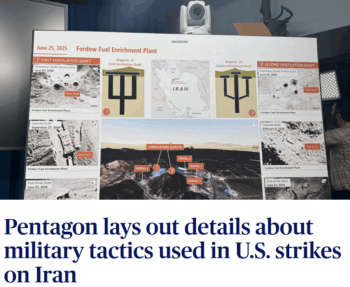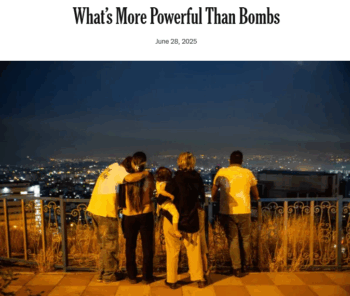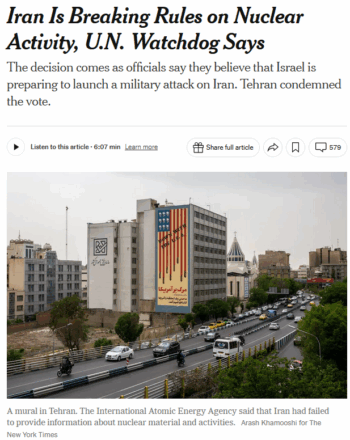Janine Jackson interviewed Citations Needed‘s Adam Johnson about media in war mode for the June 27, 2025, episode of CounterSpin. This is a lightly edited transcript.

AP (via PBS, 6/26/25)
Janine Jackson: We are recording June 26 in medias res, but AP’s latest gives us enough to start:
Defense Secretary Pete Hegseth and Gen. Dan Caine doubled down Thursday on how destructive the US attacks had been on Iran’s nuclear facilities, and described in detail the study and planning behind the bombing mission, but they stopped short of detailing how much the attack set back the nation’s nuclear program.
We hear also Trump saying, “I’m not happy with Israel because they have broken the ceasefire” that he, we hear, created, adding that Iran and Israel have been fighting “so long and so hard that they don’t know what the fuck they’re doing.” I can’t say that word on the radio, says the FCC, but Trump can say it because—well, you and I don’t know.
The US went to war with Iran last week without congressional, much less public, approval. But most of us only know what we know through corporate news media, and that’s a problem.
Joining us now is Adam Johnson, media analyst and co-host of the podcast Citations Needed. He’s coauthor, with In These Times contributing editor Sarah Lazare, of a couple of recent relevant pieces in In These Times. And he joins us now by phone from Illinois. Welcome back to CounterSpin, Adam Johnson.
Adam Johnson: Thank you for having me.
JJ: So we don’t know what’s going to happen with Iran. Maybe we’re not at war, that would be great, but sadly, we do know what corporate news media will do, because they’ll do what they do. We saw them pull out the playbook, scratch out Iraq, Afghanistan, Eastasia, and write in Iran; or maybe scratch down deeper to get to Iran 1953, and here we go again. It’s many things, but one thing for sure that it is is predictable.

Column (6/22/25)
AJ: So the primary thing that the news media keep doing, pundits and reporters alike, specifically Jake Tapper at CNN, which we wrote about, is they keep saying “nuclear weapons program.” And the goal, generally, is just to put the words “Iran” and “nuclear” in the same sentence, over and over and over again.
The public will largely fill in the blanks, and the media make no effort to even really point out that they, in fact, don’t have a nuclear weapon, or a nuclear weapons program, which is a really important piece of context to know, but it’s almost never mentioned. And this is according to the US intelligence’s own assessment, DNI, CIA, 19 other different intelligence agencies, all came to the same conclusion, and have since 2007.
However, pundits repeatedly say “nuclear weapons program,” but it’s not a nuclear weapons program. And there’s several instances, like I said, of Jake Tapper saying it, several people in Congress have said it. You could say maybe it’s a slip of the tongue by accident, but when basically no one else on CNN but Jake Tapper does it, it doesn’t really seem like an accident; it seems like he’s very clearly making an assertion. Now, if Jake Tapper has access to secret, proprietary intelligence that the CIA doesn’t have, maybe he should tell them?
And what we saw in the buildup to Trump’s bombing of Iran, which we now know was largely theatrical, thank God, was that the sort of ticking time bomb scenario, that he and JD Vance and others were going to the media with, was obviously, by their own admission, and by the New York Times’ own reporting, not based on any new intelligence. It was “a reassessment of old intelligence,” I believe is how the New York Times put it. There’s another name for that: It’s called ideologically motivated bullshit.
But repeatedly, the CIA, which weirdly was pushing back on this, I guess to their credit, in the Wall Street Journal and CNN, was saying, No, no, no, no. Iran’s increased enriched uranium, but it’s just a bargaining chip. It’s a way of getting the US to come to the table so they can relieve these sanctions which have crippled their economy, the only mechanism they plausibly have to do that. But they made no decision. And even if they did make a decision to build a bomb, it would take upwards of three years.
So this is the context that is completely missing or overshadowed, and there’s going to be a poll coming out. I asked one of these progressive polling groups to add it, and I don’t know when it’s going to come out, but what I’d be curious to know is, what percentage of the American public thinks that Iran currently has a nuclear weapon? I suspect it’s probably 70-some odd, 80%.
Because, again, if you say the word “nuclear” and “Iran” over and over again, people are going to have that impression. They don’t believe—why would they have a civilian program? Even though, of course, over 30 countries have a civilian nuclear program but don’t have nuclear weapons; it’s pretty common. And that is just not part of how the public interprets it.
So the public is widely misled on this issue, which, again, gives the impression of some radical cartoon “terrorist” who’s going to blow up Tel Aviv or Manhattan.

New York Times (6/28/25)
Second to that, you have a lot of the New York Times opinion section, for example, rushing to delegitimize the government, citing a very dubious poll saying 80% of Iranians want regime change, when all other polls show the number is probably closer to 40 or 50.
And, of course, how that regime change happens is very contestable; a lot of people hate Trump, but they don’t want China to come bomb us. That’s a totally different claim, right?
You had laundering of the Foundation for Defense of Democracies, which is a pro-Israel think tank, you had laundering of their claims that Iran is now housing the head of Al Qaeda. This is all a rehash, word for word, of Iraq War stuff.
So the New York Times was doing its part, as were some other outlets. But for the most part, the White House seems to have wanted a “cool bombing” PR thing. And then what some suspect, and I don’t know, this is just idle speculation, is that Israel was suffering more damage than people knew. And unlike bombing South Lebanon or Gaza, Iran can actually fight back, and Israel couldn’t sustain or couldn’t maintain its defense posture.
And so they basically used this as a way of getting a ceasefire that they needed anyway. But not by lack of trying on the part of the Washington Post, which actually called for Trump to keep bombing Iran in their editorial board.

FAIR.org (6/23/25)
JJ: There are so many questions that are under the table in this conversation, which is what makes me so upset with media. Media pretend they’re posing questions, and so we’re supposed to imagine that they’ve considered them deeply, but to just draw us back to basics: If the question is, “Should the US bomb Iran?” well, the answer is no, because that’s an overt violation of domestic and international law. The Constitution forbids it, the War Powers Resolution forbids it. But for corporate media, it’s like Bryce Greene just wrote for FAIR.org, the New York Times editorial board says, “America Must Not Rush Into a War Against Iran.” Of course we can do it, but let’s keep it cute, right? These are illegal actions.
AJ: They did the exact same thing in Iraq on March 2003. They published “No War With Iraq,” But if you read it, it says no war until you let the weapons inspectors do their job.
And then in the month prior, they published an editorial in February 2003, saying if Saddam Hussein doesn’t hand over his biological and chemical weapons, that the US has to use military force. Now that’s an argument for war, because of course Saddam Hussein didn’t have biological and chemical weapons.
JJ: So he can’t show them.

New York Times (6/12/25)
AJ: So, yeah, this is the scope of debate. The scope of debate is not, “Is it justified or moral? Why is Israel not a member of the Non-Proliferation Treaty? Why do they not have IAEA inspectors?” There’s this kind of faux-liberal world order narrative.
And that’s why the IAEA report was so powerful. It was a 19 to 16 vote, it was almost along party lines, kind of pro-US/Israel, pro-Russia/pro-China.
And then, quickly, the head of the IAEA says, “Oh, no, no, don’t interpret this as us saying that in any way Iran has made a decision or is somehow accelerating an actual nuclear program.” But that’s not how it was interpreted. Like the New York Times, which had it as a head story the day Israel started bombing Iran, to give it this veneer of liberal rules enforcement, which is obviously absurd, because Israel is not subject to any of these rules. It has an estimated 100 to 300 nukes.
So the scope of debate in these editorials and these opinion sections is not “Do we have any legitimacy to be bombing Iran?” but, “Is bombing Iran the best way to stop them from enriching uranium?” which, again, is entirely within their rights under international law. They have a right to a civilian nuclear program, like any other country does.
JJ: And this is the implicit undergirding of corporate media’s debate, that some countries are “good,” and they can have world-destroying weapons—declared, undeclared, whatever. And some countries are, as Van Jones put it on CNN, “not normal.” Because, if we are looking for “normal,” we got Donald Trump! We got masked agents abducting people off the street…

Adam Johnson: “The scope of debate…is not ‘Do we have any legitimacy to be bombing Iran?’ but ‘Is bombing Iran the best way to stop them from enriching uranium?’”
AJ: And we have the US and Israel openly operating a mass starvation campaign through human genocide, not even euphemism. So I guess this is what normal countries do. They have a daily ritual killing of scores, sometimes hundreds of Palestinians that are desperately lining up for grains of rice and wheat. That’s what normal countries do.
And, again, it’s very weird. There’s this zombie liberal “rules-based order” framing that is still going on, despite the fact that there’s an unfolding genocide that’s lost all pretense of international law. And so there’s this “Oh, the US has to be a policeman and police the world” faux-liberal framework that Trump doesn’t take seriously, Netanyahu doesn’t take seriously, but the media, especially the kind of prestige editorial pages and opinion pages, the New York Times and Washington Post, have to maintain that this is still a thing.
And, of course, people like Van Jones and Jake Tapper at CNN, this idea that there’s normal countries, there’s the goodies and then there’s the baddies. And so even though the goody countries are carrying out this almost cartoon evil, completely removing a people in whole or in part from Earth, and an actual explicit starvation campaign, not even hiding it—that’s what they’re calling it; it’s very weird.
In 2003, when they did this, there was a little more kind of post–Cold War credibility, and now there’s zero. And it’s very strange to watch the vestiges of that framework still go on, regardless of the new facts, and the fact that the majority of Americans think that there’s a genocide going on. No one outside of the Washington Post editorial board and the New York Times editorial board buys any of this shit.
JJ: Exactly. And just, finally, when you try to intervene, you find yourself making arguments at a level that you don’t accept. Like, “Well, they shouldn’t attack Iran’s nuclear capacities, nuclear facilities.” They said “nuclear weapons,” but then they can suck weapons out of it, and they know that it’s still going to be read the same way.
AJ: Yeah, it’s implied.
JJ: And then you also want to say, “Well wait, there’s no evidence of Iran having weaponry.” And then you want to say, “Well, Iran’s allowed to have nuclear weaponry.” And then you have to say, “If we acknowledged Israel’s nuclear weaponry, we wouldn’t legally be allowed to arm them.” So there’s all of these unspoken things, and yet, to silence them is the price of admission to get into “serious people conversation.” And that’s obviously why a lot of people clock out of elite media, because the price of admission is too high.
AJ: It is just not credible, to sit there and talk about international law; you have to have some kind of ostensibly high-minded liberal reason why you’re bombing a country. It’s just not credible, with what we’ve seen over the last two years. It’s very strange. And there’s a kind of think tank/media nexus that has to maintain this fiction, and watching them talk about Iran in such a way that was, again, every kind of terrorist cartoon, every “war on terror” framing, ticking time bomb…. Again, it doesn’t have to make any sense. It’s supposed to just be vaguely racist and vaguely feels true.
But the question in a lot of these panels was like, “What’s the best way to overthrow the regime?” You’d have a liberal on being like, “Well, we need to do the kind of meddling NED stuff and promote groups and this and that, and maybe even arm some ethnic minority groups, and maybe some Kurdish rebels.” And they’re openly just discussing how you overthrow a government.
It’s like, well, OK, so you see them as being illegitimate, can you just provide a list of the legitimate and illegitimate governments for us, and then we can figure out how the US is supposed to take out all the illegitimate ones? The whole thing is so casually chauvinist and casually imperial, they don’t even think about what they’re doing.
JJ: Exactly. Well, where do you see hope, as you are still contributing to media? You believe in journalism; where do you see daylight?
AJ: You know, I don’t. I think social media helps in some ways. Obviously I think it democratized how people receive news coming out of Gaza, but even that’s been manipulated. They see social media CEOs get dragged in front of Congress, and they get disciplined under the auspices of fighting polarization or hate speech or fake news, but it’s all to prevent media that doesn’t fall within that national security directive, quite explicitly.
So I don’t know. I think those algorithms are easily manipulated. I think that the ways in which, even though very few people actually read the New York Times editorial board or watch the Sunday shows, but the ways in which those ideological, agenda-setting institutions still manage to trickle down, and promote seriousness and the concept of seriousness and what is serious and what isn’t, is still very effective. And I don’t really see that changing anytime soon.
JJ: Corporate news media are so many steps removed from human understanding, but they convey so powerfully the air that this is how smart people think. And you can think differently, but that will make you marginal. And even critics are stuck at, like, “don’t drop bombs.” And it becomes this very stale, rehearsed conversation, and we already know where it leads.
And what corporate media won’t do is show the vigor and the work and the intelligence of diplomacy. Media could make peacemaking a heroic effort. Kristi Noem could cosplay as a negotiator. They could sell a different story if they wanted to, is my feeling. So I don’t feel like journalism per se is broken. I feel like it’s being mal-used.

Joy Reid (with Jamie Metzl) on CNN (6/25/25)
AJ: Yeah, I think to the extent to which they have done that, there’s been people saying, “Oh, the Obama deal was working.” And that’s true to an extent, but the Obama deal was still predicated on a totally arbitrary and unfair sanctions regime that is not applied to other countries. But it is correct that it was working, I mean, if one assumes that “working” is Iran not having enriched uranium. So there were some people saying that.
And Joy-Ann Reid I would like to highlight as someone who did a good job pushing back on a lot of the stuff on CNN. She was fired because of her reporting on Gaza at MSNBC. But she’s reappeared as a pundit on CNN to, I guess, play devil’s advocate, as it were. And she’s done a tremendous job, actually, going on CNN and punching down these idiots. That was kind of nice to see. It’s very rare, though. Who knows if they’ll ask her back after that.
But the debate is like, “how much should we sanction Iran?” on the far left end of the spectrum. The other end of the spectrum is “should we go for regime change and kill hundreds of thousands of people?” Instead of saying, well, OK, if we do believe in these high-minded liberal concepts of an international rules-based order, then why don’t we go back to the drawing table and come up with rules, and actually apply them equally? Come up with a system where the US allies and US client states and to a great extent the US—which of course doesn’t sign a bunch of different treaties, cluster munitions, the ICC, the International Criminal Court—why don’t we come up with an actual rules-based order, instead of just whatever the US State Department and its buddies in Tel Aviv and Riyadh think?
That would be something that would maybe be worth pursuing, but it’s not. It’s this kind of weird, zombie, fake-consistent order, where if you’re deemed as being hostile to US and Israeli and Saudi security architecture in the Middle East, you are seen as per se ontologically evil, and in urgent need of disciplining, and in urgent need of either regime change or bombing or crippling sanctions that ruin your economy.
And that’s just taken for granted. And this is not particularly liberal or very thoughtful or very worldly. It’s knee jerk. It’s chauvinist. It’s obviously oftentimes racist, and that’s what narrows the debate. There’s no sense that we should apply any of these standards to any other country.
JJ: All right then. Well, we’ll end there for now. We’ve been speaking with media analyst Adam Johnson. He’s co-host, with Nima Shirazi, of the podcast Citations Needed. His substack is called the Column, and his work on Iran and other issues, co-authored with Sarah Lazare, can be found at InTheseTimes.com. Thank you so much, Adam Johnson, for joining us this week on CounterSpin.
AJ: Thank you.
This content originally appeared on FAIR and was authored by Janine Jackson.